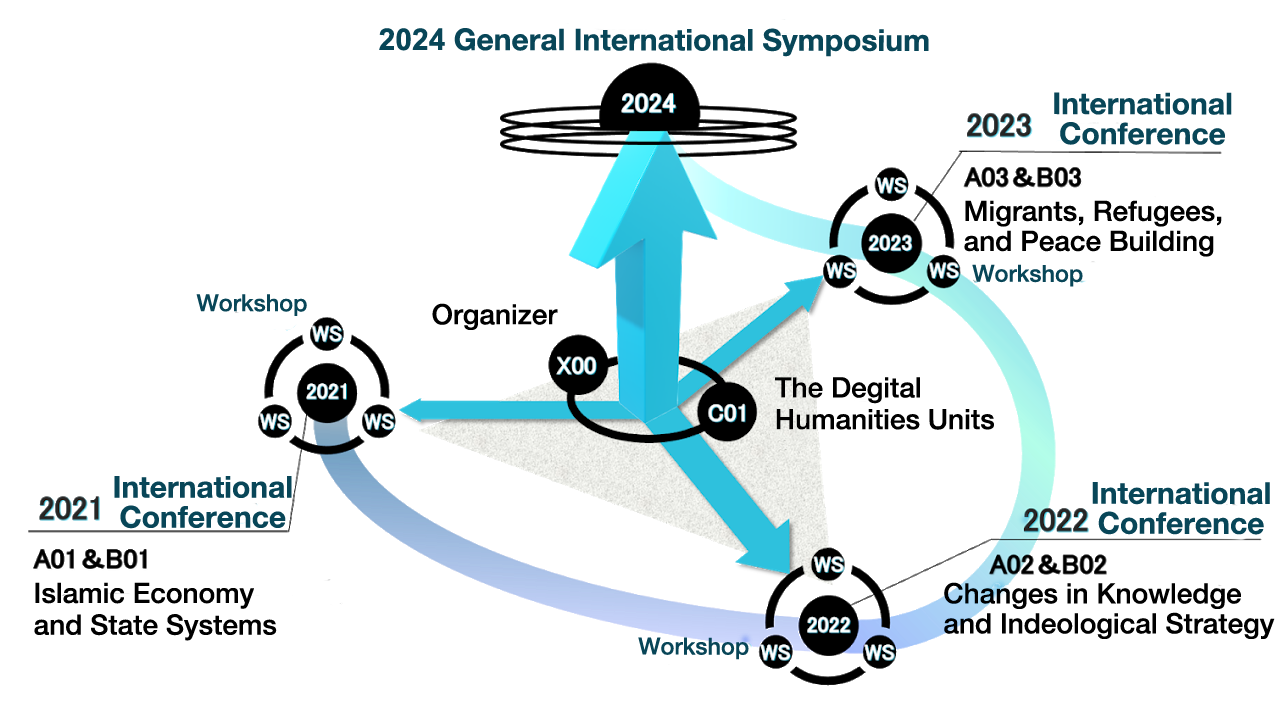Each of our proposed themes of research will be interwoven with the others, and the topics of connectivity and trust building will be viewed flexibly from all angles: from the micro to the macro, across axes of space and time. For this reason, we will be presenting seminars and workshops hosted by as many permutations as possible of the various Planned Research Groups.
As part of this project, we will host large-scale international conferences to be held in 2021 in Kyoto, in 2022 in Osaka, and in 2023 in Tokyo, which will be organized by pairs of Groups related in theme. The Organizer will be responsible for overseeing and supporting the other Groups, and Planned Research Group C01, the digital humanities Unit, will be involved in all of the above conferences. In 2024, to mark the final year of the project, the Organizer will host a General International Symposium in Tokyo.

Planned Research Group A02 focuses on how Islamic knowledge has been translated and developed, and the roles it has played in negotiation and dispute resolution. From the perspectives of “the propagation and translation of Islamic thought and knowledge,” “legal pluralism centered on Islamic law,” and “negotiation and networking in international trade,” this group looks for the wisdom of connectivity on the basis of field studies and documentary surveys.
Planned Research Group A03 conducts research mainly through fieldwork and documentary surveys on the specific topics of “community formation of Muslim migrants in Japan, Europe, the United States and Southeast Asia, and relationships with the host societies,” “connectivity among migrant communities in relation to refugee assistance,” and “initiative and influence of migrants and refugees in international politics.” The broad theme of this group is the building of mutual trust and relationships between Muslims and non-Muslims within the issues of large-scale migration and refugees in modern times.
Planned Research Group B01 conducts research mainly by means of documentary surveys in libraries and archives around the world on the specific topics of “ideas, international law, and diplomatic relations among Muslim states,” “trade and international relations in the maritime world,” and “connectivity and the imperial character of the ruling elite,” in order to clarify how connectivity and trust building were related to the Islamicate state system and the “Muslim World” they built.
Planned Research Group B02 discusses urgent issues of today, including division and conflicts such as “Rohingya problems in Myanmar,” “international disputes regarding the Syrian situation,” “religious conflicts in India” from the perspectives of both Muslims and non-Muslims, to identify the dynamics that religious thought and dispute resolution strategies bring to trust building in the tangled web. While based on a perspective of religious certitude, Muslims sometimes consider changes in strategy, such as possibilities of changing attitudes based on the religious legitimacy. This group aims to reveal such trust building contexts unique to Muslims.
Planned Research Group B03 will conduct field research on local societies where coexistence between Muslims and non-Muslims has become a point of political confrontation and has finally escalated into conflict, including examination of themes such as “trust building and peacebuilding with non-Muslims,” “provision of support, protection, and asylum through the vitalization of connectivity in the Islamic World,” and “dialogues and mediation among different ideologies” in conflict-affected areas. They conduct comparative studies about practical wisdoms of peacebuilding and trust building for transcending the divisions by organizing seminars and workshops, etc.
Planned Research Group C01 aims at visual analytics of “connectivity” and clarifies how “trust” was embedded in the web of connectivity. Through visualization of networks on the basis of text data extracted from biographical works produced in Islamic civilization, they overlay the mesh of various kinds of human relationships, such as marital relations, networks of academic schools, political patronage, and personal connections made through the intermediation of saints to reveal tacit knowledge. In addition, they develop various approaches to the visualization of data in coordination with other groups.
Planned Research Group A01 aims to clarify the uniqueness and universality of several Islamic economic institutions, including monetary, financial, market, and ownership systems, in the context of inter-period and inter-regional comparisons. This group in particular picks up on the following research topics based on field research and document surveys, such as “the mobility of Islamic economy, which implies flexibility and supra-connectivity,” “comparisons between the Islamic economy and capitalism,” and “the potential of the Islamic economy in the future global society.”